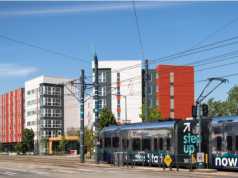Plan to Double U.S. Energy Productivity by 2030 Through Energy Efficiency Announced Today
Alliance to Save Energy‘s Commission on National Energy Efficiency Policy unveils measures to spur the economy
SEATTLE – February 8, 2013 – (RealEstateRama) — The Alliance to Save Energy’s Commission on National Energy Efficiency Policy announced this morning at a National Press Club media briefing its plan to double the United States’ energy productivity by the year 2030. Alliance co-chairs U.S. Senator Mark Warner (D-Va.) and National Grid U.S. President Tom King released the commission’s report.
“Doubling our energy productivity will yield huge returns for our economy and increase our competitiveness,” Sen. Warner said. “This bipartisan plan can serve as a blueprint to advance energy efficiency and bring direct and tangible benefits to American families and businesses while building a stronger economy and healthier environment.”
Seattle City Light Superintendent Jorge Carrasco is a member of the Alliance to Save Energy Board of Directors and was an active member of the commission in crafting it’s final report.
“At a time when the nation is looking for real solutions to our economic challenges, the energy community is stepping up to provide some answers that can be done now, without waiting,” Carrasco said. “There are energy efficiencies that can be tied to real economic growth today – and reaching a doubling of productivity in 2030 as the National Energy Efficiency Policy outlines.”
The recommendations outlined today could result in the following national benefits:
• Add 1.3 million jobs
• Cut the average national household energy costs by $1,000
• Save American businesses $169 billion annually in reduced energy expenses
• Increase the GDP by 2 percent
• Decrease energy imports by more than $100 billion a year; and
• Reduce CO2 emissions by one-third
The plan announced today by the Commission is a national effort to save America $327 billion and create a 3.7 percent energy productivity increase by 2030 through:
• Retooling and modernizing industry to be more energy efficient, realizing $94 billion in savings
• Increasing energy efficiency in our transportation sector for another $139 billion; and
• Deploying construction methods to increase energy efficiencies in new and existing buildings to save $97 billion.
Commission member and former Republican New York Governor George Pataki added, “Energy productivity is synonymous with economic prosperity and competitiveness. This plan advances a public-private partnership to spur investment, and could save local, state and the federal governments $13 billion in 2030 alone.”
“This a bold step to infuse national economic growth through energy efficiency, something the City of Seattle and the Northwest have been investing in for many years to keep utility costs low and to promote commercial and residential savings through energy efficiencies,” Carrasco said. “Since the late 1970s, City Light has invested $400 million in conservation incentives and programs, saving more than 19 billion kilowatt-hours of energy – or enough energy to power two metropolitan areas the size of City Light’s service territory for a year. That equals approximately $800 million not spent on energy costs by businesses and residents, meaning that money can go into other investments or savings to fuel our local economy.”
Locally, investments in energy efficiencies are being put into action. The Seattle City Council unanimously passed an ordinance Monday, Feb. 4, authorizing Seattle City Light to enter into an agreement with Nucor Steel for increased energy efficiencies. Nucor is City Light’s largest customer and an international manufacturer of steel used in the construction industry.
“The Nucor agreement is a great example of how business and industry can partner with utilities to increase productivity through modernization, resulting in reduced energy, consumption and production cost savings,” added Carrasco. “The energy saved every year from this agreement is enough to power 540 Seattle-area homes annually.”
Many of the commission’s recommendations focus on work that Seattle, the State of Washington, and the Pacific Northwest have been pursuing successfully for several years. Examples include the aggressive energy building codes adopted by the state and the city, and, more recently, their energy benchmarking and disclosure requirements for buildings.
Another area where the Northwest is taking a lead includes regional efforts to identify and advance emerging technologies, led by the Northwest Energy Efficiency Alliance and the Bonneville Power Administration. City Light in partnership with the City’s Office of Sustainability also is piloting a financing program that gives utility customers a utility “on-bill” loan repayment option for residents who make energy saving investments in their home. The program is a part of the U.S. Department of Energy’s Better Buildings program.
The recommendations are also consistent with recommendations released by the Seattle Green Ribbon Commission last December, outlining what actions the City should take to meet Seattle’s ambitious climate protection goals. Carrasco served on the Seattle Green Ribbon Commission, which included 26 community, environmental and business leaders. The Green Ribbon Commission’s recommendations are currently out for public comment and can be found at: Greenspace. Those recommendations, along with public comment, will inform the development of the Seattle Climate Action Plan, which is expected to be released this April.
“We know that the national and local goals are achievable,” Carrasco said. “The good news is that these efforts will build a stronger economy and a more self-reliant energy future.”
Seattle City Light is the 10th largest public electric utility in the United States. It has some of the lowest cost customer rates of any urban utility, providing reliable, renewable and environmentally responsible power to nearly 1 million Seattle area residents. City Light has been greenhouse gas neutral since 2005, the first electric utility in the nation to achieve that distinction.
The Alliance to Save Energy is a coalition of prominent business, government, environmental and consumer leaders who promote the efficient and clean use of energy worldwide to benefit consumers, the environment, economy and national security. www.ase.org.
Contact:
Scott Thomsen (206) 386-4233




